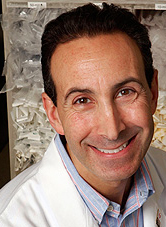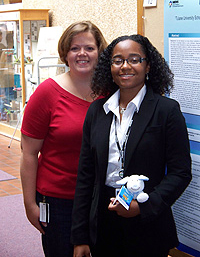By Eddy Ball

"I really want to be involved in preventive medicine," Haynes said. "Working with such community groups as the Wake County Asthma Coalition is a vital contribution to preventive medicine. It is at this point that effectiveness of research is determined."
(Photo courtesy of Steve McCaw)
Thanks to the American Recovery and Reinvestment Act (ARRA), the 2009 NIEHS Summers of Discovery Program may prove to be a turning point for aspiring physician-scientist Amber Haynes. A graduate student with a master's degree in public health from Tulane University and a lifelong interest in science and the applications of research in clinical medicine, Haynes was clearly in her element this summer working in the NIEHS Laboratory of Respiratory Biology Environmental Cardiopulmonary Disease Group and Clinical Research Unit.
Financially, ARRA stimulus funding made possible her summer fellowship. Intellectually, her research under the supervision of NIEHS Acting Clinical Director Darryl Zeldin, M.D., and mentor Biologist Michelle Sever, who also holds a master's degree in public health, broadened her perspective on research translation. Haynes' summer internship led to a one-year appointment as a post-baccalaureate Intramural Research Training Award (IRTA) fellow for the 2009-2010 academic year.
Of her experience working in the Zeldin lab, Haynes said succinctly, "It was awesome." She added that the Summers of Discovery's integrated scientific, communications and career development program will be "very helpful" as she applies to medical schools during the upcoming year.
Looking back on some of her seminar experiences this summer, Haynes singled out the July 8 seminar "Career Options in the Biomedical Sciences." Remarks by two dual degree holders on the seminar panel — Principal Investigators Stephanie London, M.D., Dr.PH., and Carmen Williams, M.D., Ph.D. — she found especially meaningful. "Their comments encouraged me to consider obtaining a Ph.D. in Epidemiology," she said.

Zeldin, above, designed the home test-kit study in collaboration with Sever and former NIEHS investigator Samuel Arbes, Ph.D. He is also supportive of Haynes' plans to pursue a doctoral degree in both medicine and epidemiology.
(Photo courtesy of Steve McCaw)
Haynes' work as a summer fellow culminated in her first place award in the graduate division of the summer poster competition (see related story) for her research on "Dust Mite Allergen Reduction Study: Preliminary Analysis of In-Home Test Kit Data," co-authored with Sever and Zeldin. During her year as an IRTA fellow, Haynes plans to be a presenter at several asthma meetings, including the American Academy of Allergy, Asthma and Immunology in New Orleans in February, and publish the results of her research project.
Haynes acknowledges the influence of several people and experiences in shaping her commitment to preventive medicine and translational research. In her native Atlanta, she was involved in the Medical Post Explorers Program at Morehouse School of Medicine, and the student services coordinator there, Alex Adams, was the person who told her about NIEHS. As a graduate student at Tulane in post-Katrina New Orleans, Haynes said she gained insight into "the need for effective public health coordination during a crisis and how a lack of coordination can drastically change the quality of life of a population during and years after a disaster."

Michelle Sever, above left, "has been a wonderful mentor who generously shared her expertise in epidemiology and biochemistry," Haynes said. Sever also introduced her to people and resources at the Wake County Asthma Coalition and NIEHS.
(Photo courtesy of Steve McCaw)
Looking ahead, Haynes reflected the ways "living and attending school in the south as an African American female afforded me a valuable perspective" on health disparities that exist in this and other demographics. "I will use [my experiences] as a guide when practicing preventive medicine," she explained. "Clinical epidemiology that involves addressing disparities in access and affordability in terms of effective health education and healthcare — not simply efficacy in intervention — is my long term interest."
This article originally appeared on the National Institute of Environmental Health Sciences Newsletter website.